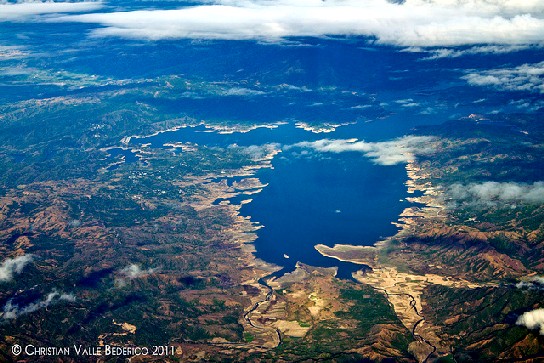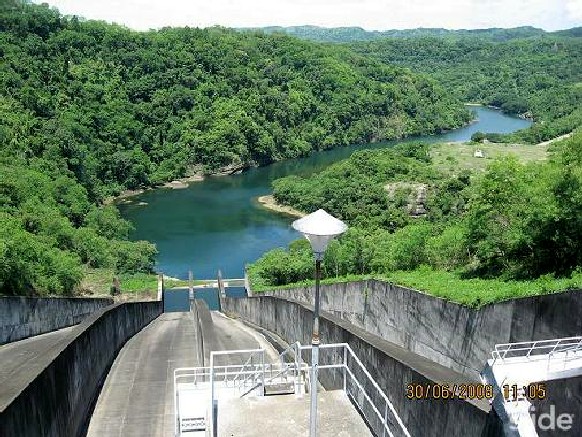The Powerful Pantabangan Dam in Nueva Ecija
PANTABANGAN DAM
Pantabangan Dam is an earth-fill embankment dam on the Pampanga River located in Pantabangan in Nueva Ecija province of the Philippines. The multi-purpose dam provides water for irrigation and hydroelectric power generation while its reservoir, Pantabangan Lake, affords flood control. The reservoir is considered one of the largest in Southeast Asia and also one of the cleanest in the Philippines. Construction on the dam began in 1971 and it was completed in 1977.
In May 1969, the Congress of the Philippines authorized the development of the Pampanga Basin with Republic Act No. 5499. In October of that year, detailed studies of the Pantabangan site were carried out and lasted two years. By June 11, 1971, Pantabangan was an old town of around 300 years old. The dam went into operation in February 1977 and was completed later in May. Approximately 1,300 people were relocated from the dam’s reservoir zone.


In May 1966, the Old Philippine Congress passed the Upper Pampanga River Project Act (Republic Act 5499) authorizing the construction of the Pantabangan Dam and its appurtenant structures. The groundbreaking ceremony took place on June 11, 1971. The project was finally completed in August 1974.
The construction of the Dam had great economic and social impact on the lives of Pantabangeños. About 8,100 hectares (20,000 acres) of productive farmland and the town center (East and West Poblacion) along with seven outlying barangays (Villarica, Liberty, Cadaclan, San Juan, Napon-Napon, Marikit and Conversion) were submerged under the new lake. Residents were relocated to higher ground overlooking the vast reservoir, which became the new Pantabangan town center. Before the expansion of the dam through the Casecnan Project in the 1990s, the belfry of the 18th century church resurfaced from the dam’s summer low water level. During drought in 1983, some areas of the old town emerged.
The Pantabangan Dam is claimed to be the second largest dam in Asia, and supplies the irrigation requirements for about 77,000 hectares (190,000 acres) of agricultural lands in Central Luzon. Its power station generates 112 megawatts of hydroelectric power. Read More: wikipedia.org
TABLE OF CONTENTS
Nueva Ecija – Rice Granary of the Philippines
Interesting Spots in Nueva Ecija
Colorful Festivals in Nueva Ecija
Nueva Ecija Photo Gallery
Nueva Ecija Video Collection
Other Visitors Also Viewed:
The Enchanting Libtec Underground River
Best Tourist Attractions in Zamboanga del Sur
Amoingon Beach is Called The Snorkeling Capital of Marinduque
The Magnificent Baliuag Lenten (Holy Week) Procession in Bulacan
Interesting Places to Visit in Siquijor
Join the “Wet ‘n Wild” Regada Water Festival in Cavite
Fun Activities To Do in Romblon
Recent Posts
Have a Splash at the Laswitan Falls and Lagoon
LASWITAN FALLS AND LAGOON Photo from: https://www.sarwrites.com/2017/01/laswitan-lagoon.html The Laswitan Falls and Lagoon…
Cagpangi / Green Falls Lies in the Deep Medieval Forest
CAGPANGI / GREEN FALLS Photo from: https://www.solitarywanderer.com/the-green-falls/ Just about 16 kilometers…
Lanuza Surfing Grounds is a Remote Surfing Destination
LANUZA SURFING GROUNDS Photo from: https://www.surf-forecast.com/breaks/Lanuza-Rivermouth Lanuza in Surigao del Sur is…
Cagwait Beach is Often Compared to Boracay
CAGWAIT BEACH Photo from: https://www.pinterest.ph/pin/367043438355829159/ Cagwait White Beach Resort is formerly known…
Cabgan Island is Waiting to be Discovered
CABGAN ISLAND Photo from: https://en-gb.facebook.com/BaroboSurigaoDelSur27/posts Cabgan Island (or just Cabgan), is the…
Discover the Mystery of the Enchanted River
ENCHANTED RIVER Photo from: https://www.atlasobscura.com/places/hinatuan-enchanted-river Enchanted River is as mysterious as its…

